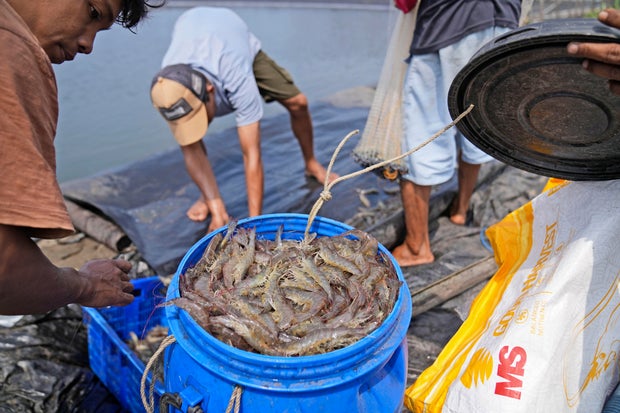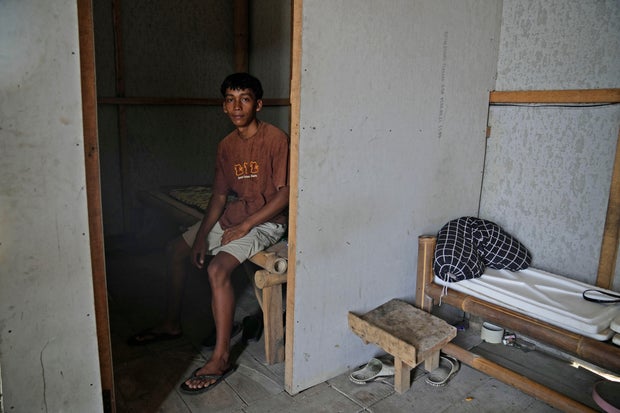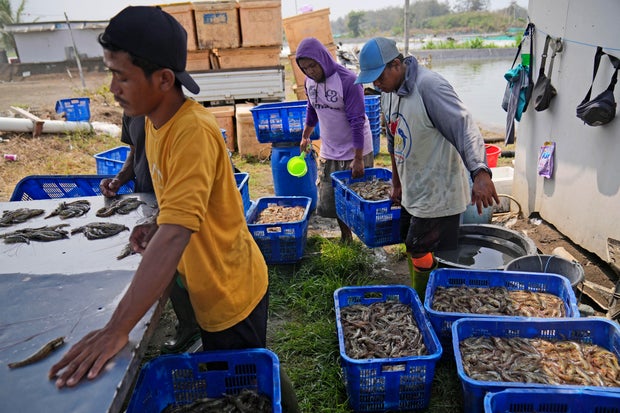CBS News
Shrimp farmers, peelers in Asia exploited by U.S. supermarkets for big profits, research finds

A new investigation focused on three of the world’s largest producers of shrimp released on Monday claims that as big Western supermarkets make windfall profits, their aggressive pursuit of ever-lower wholesale prices is causing misery for people at the bottom end of the supply chain.
The regional analysis of the industry in Vietnam, Indonesia and India, which provide about half the shrimp in the world’s top four markets — the United States, European Union, United Kingdom and Japan — is based on research done by an alliance of NGOs. It found a 20%-60% drop in earnings from pre-pandemic levels as producers struggle to meet pricing demands by cutting labor costs.
In many places this has meant unpaid and underpaid work through longer hours, wage insecurity as rates fluctuate, and many workers not even making low minimum wages.
Dita Alangkara / AP
Supermarkets linked to facilities where exploited labor was reported by workers include Target, Walmart and Costco in the United States, Britain’s Sainsbury’s and Tesco, and Aldi and Co-op in Europe.
The regional report brought together more than 500 interviews conducted in-person with workers in their native languages, in India, Indonesia and Vietnam — published separately as country-specific reports — supplemented with secondary data and interviews from Thailand, Bangladesh and Ecuador.
In Vietnam, Hawaii-based Sustainability Incubator investigators found that the workers who peel, gut and devein shrimp typically work six or seven days a week, often in rooms kept extremely cold to keep the product fresh.
Dita Alangkara / AP
Some 80% of those involved in processing shrimp are women, many of whom rise at 4 a.m. and return home at 6 p.m. Pregnant women and new mothers can stop one hour earlier, the report found.
In India, researchers from the Corporate Accountability Lab found that workers face “dangerous and abusive conditions.” Highly salinated water from newly dug hatcheries and ponds, tainted with chemicals and toxic algae, also contaminate surrounding water and soil.
Unpaid labor prevails, including salaries below minimum wage, unpaid overtime, wage deductions for costs of work and “significant” debt bondage, the report found. Child labor was also found, with girls aged 14 and 15 being recruited for peeling work.
12-hour days at below minimum wage
In Indonesia, three non-profit research organizations found that wages have fallen since the COVID-19 pandemic and today average $160 per month for shrimp workers, below Indonesia’s minimum wage in most of the biggest shrimp-producing provinces. Shrimp peelers routinely are required to work at least 12 hours per day to meet minimum targets.
Switzerland’s Co-op said it had a “zero tolerance” policy for labor law violations and that its producers “receive fair and market-driven prices.”
Germany’s Aldi did not specifically address the issue of pricing, but said it uses independent certification schemes to ensure responsibly sourcing for farmed shrimp products, and would continue to monitor the allegations.
“We are committed to fulfilling our responsibility to respect human rights,” Aldi said.
Sainsbury’s referred to a comment from the British Retail Consortium industry group, which said its members were committed to sourcing products at a “fair, sustainable price” and that the welfare of people and communities in supply chains is fundamental to their purchasing practices.
The Vietnam Association of Seafood Exporters and Producers issued a statement calling the allegations in the report “unfounded, misleading and detrimental to the reputation of Vietnam’s shrimp exports,” citing government labor policies.
Dita Alangkara / AP
The NGO’s report stresses that using middlemen to buy the shrimp obfuscates the true sources of shrimp that appear in western supermarkets, so many retailers may not be following ethical commitments they’ve made about procuring shrimp.
Only about 2,000 of the 2 million shrimp farms in the major producing countries are certified by either the Aquaculture Stewardship Council or the Best Aquaculture Practices ecolabel, making it “mathematically impossible for certified farms to produce enough shrimp per month to supply all of the supermarkets that boast commitments to purchasing certified shrimp,” the report says.
U.S. policymakers could use antitrust and other laws already in place to establish oversight to ensure fair pricing from western retailers, rather than imposing punishing tariffs on suppliers, says Katrin Nakamura of Sustainability Incubator, who wrote the regional report.
In July, the European Union adopted a new directive requiring companies to “identify and address adverse human rights and environmental impacts of their actions inside and outside Europe.”
Officials from Indonesia and Vietnam have met with the report’s authors to discuss their findings and look for solutions.
Given the current disparity in retail and wholesale prices, paying more to farmers would not have to mean higher prices for consumers, the Sustainability Incubator report said, but it would mean lower profits for the supermarkets.
“Labor exploitation in shrimp aquaculture industries is not company, sector, or country-specific,” the report concludes. “Instead, it is the result of a hidden business model that exploits people for profit.”
___
This story was supported by funding from the Walton Family Foundation. The AP is solely responsible for all content.
CBS News
Port workers at East and Gulf Coast terminals steam toward a strike for the first time since 1977

U.S. ports along the East and Gulf Coasts are set to close on Tuesday, with the union representing tens of thousands of dockworkers and an industry group representing port operators and shipping companies at loggerheads over a new labor contract.
Experts warn that prolonged work stoppage could lead to higher costs on goods around the nation and create shortages ahead of the holiday shopping season. A one-week strike could cost the economy nearly $3.8 billion and increase the cost of consumer goods, according to the Conference Board, which called the situation a “political minefield” given that it comes just ahead of the November presidential election.
Other estimates of the potential economic hit also suggest the strike could take a toll, although the losses would likely amount to a small fraction of the nearly $29 trillion U.S. economy.
“A port strike could cost the U.S. economy billions of dollars a day, hurting American businesses, workers and consumers across the country,” Business Roundtable CEO Joshua Bolten said in a statement this weekend. “We urge both sides to come to an agreement before Monday night’s deadline.”
Such a breakthrough seemed unlikely as of late Monday afternoon.
The contract between the International Longshoremen’s Association (ILA) and the United States Maritime Alliance (USMX), which represents the ports and ocean carriers, expires at midnight Monday. A strike is set to officially kick off as of 12:01 Eastern Time on Tuesday, according to the ILA.
The two sides haven’t been at the bargaining table since June, and as of Monday afternoon there was little sign that they were set to resume talks.
A total of 14 ports involving some 25,000 workers could be affected by the strike, according to USMX: Baltimore; Boston; Charleston, South Carolina; Jacksonville, Florida; Miami; Houston; Mobile, Alabama; New Orleans; New York/New Jersey; Norfolk, Virginia; Philadelphia; Savannah, Georgia; Tampa, Florida; and Wilmington, Delaware.
The ILA is demanding sizable wage hikes and a complete ban on the use of automated cranes, gates and container-moving trucks in unloading or loading freight at ports handling about half of the country’s ship cargo.
“The ocean carriers represented by USMX want to enjoy rich billion-dollar profits that they are making in 2024, while they offer ILA longshore workers an unacceptable wage package that we reject,” the union said in a statement on Monday.
USMX did not immediately return a request for comment.
If a strike were deemed to threaten national health or safety, under the Taft-Hartley Act President Joe Biden could seek a court order requiring an 80-day cooling-off period. But Biden administration officials have repeatedly said he would not take to action to prevent a strike and that the contract dispute should be resolved through collective bargaining.
“Senior officials have been in touch with USMX representatives urging them to come to a fair agreement fairly and quickly — one that reflects the success of the companies. Senior officials have also been in touch with the ILA to deliver the same message,” White House spokesperson Robyn Patterson said.
With the first strike by the ILA at East and Gulf Coast cargo terminals since 1977 seemingly imminent, officials in New York and New Jersey have been working to minimize any potential supply-chain disruptions, setting up trucks to transport food and medical supplies.
Fuels like home heating oil and diesel gas are transported in ways that wouldn’t be impacted by a strike, New York Gov. Kathy Hochul said in a news conference on Monday, although she noted that the “potential for disruption is significant.”
New York does not expect shortages of essential goods anytime soon, so there’s no need to run to the grocery store and stockpile goods as occurred during the pandemic, Hochul said. Although there might be shortages of individual food items. such as bananas, should a strike persist longer than a few weeks, the state would continue to get food shipments from major markets including Canada, California and Mexico, as well as from New York itself, the governor added.
The automobile industry could feel a more immediate impact, however, with Hochul cautioning would-be buyers to call ahead.
“If you’re expecting a new car this week, it may be something you want to check with your dealer. It may not be arriving, for example, in the next few weeks,” she warned.
CBS News
What’s at stake for JD Vance, Tim Walz debate?

Watch CBS News
Be the first to know
Get browser notifications for breaking news, live events, and exclusive reporting.
CBS News
How Russia, Ukraine use drones for war

Watch CBS News
Be the first to know
Get browser notifications for breaking news, live events, and exclusive reporting.













